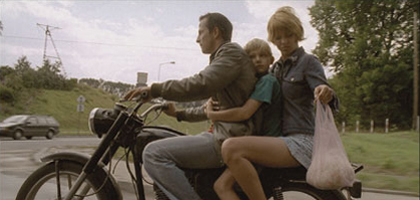Primary navigation

Poland 2007

Reviewed by Philip Kemp
Our synopses give away the plot in full, including surprise twists.
A small town in Poland, present day. Six-year-old Stefek lives with his mother, who runs a grocery store, and older sister Elka. Elka's boyfriend Jerzy sometimes takes Stefek for rides on his motorbike. At the train station Stefek sees a man he thinks is his absent father, though Elka says not. She's more concerned with escaping her dead-end job in a café by landing employment with a local Italian-owned firm, and is studying Italian at night school.
Stefek sees the man at the station again; he always changes trains there at the same time. Elka shows Stefek how to manipulate events to make things happen the way he wants, and he starts experimenting with these 'tricks'. Jerzy takes Elka, Stefek and their mother to a lake to bathe; Elka is annoyed when local siren Violka gatecrashes the trip. Stefek contrives to have his 'father' miss his connection, and with Jerzy's help makes him miss the next one. Stefek tries to fetch Elka, but only succeeds in making her late for her interview with the Italian firm.
As there's no train until the evening, the 'father' starts wandering around the town. Stefek shadows him, trying to make him go to his mother's shop. Finally he does so, but the mother has just left to bank the day's takings. The 'father' heads for the station; Stefek rushes after him but can't board the train. Instead he boards a freight train that carries him through the night and back to his hometown, where he sees his 'father', who didn't catch his train, sleeping on a station bench. The man wakes and tells Stefek, "I've been waiting for you."
On the admittedly limited evidence of two films, matters of childhood and parenting preoccupy Andrzej Jakimowski. In his debut feature Squint Your Eyes (2002), a ten-year-old girl, tired of her materialistic Warsaw parents, moves in with her burnt-out ex-teacher on an abandoned farm. Stefek, the young protagonist of Jakimowski’s second film Tricks, is in search of his real father, who walked out on the family some years back, and latches on to a man seen at the railway station who may or may not be the missing parent.
Given that the movie’s setting is a small, scruffy provincial town in Poland, you might expect a grim, downbeat study in obsession. But Tricks is as slight, sunny and inconsequential as a piece of thistledown blown on a summer breeze – and if that suggests a certain fuzzy sentimentality, the thought wouldn’t be out of place. The mood of the film, with its relaxed small-town haziness, often recalls the lighter side of Jirí Menzel – Capricious Summer (1967) comes to mind.
Central to the action is the relationship between Stefek and his 17-year-old sister Elka, a willowy blonde in a town exceptionally well supplied with attractive young women. Damian Ul and Ewelina Walendziak are well cast as the siblings – they share the same snub nose and wistful pale-blue gaze – even if 10-year-old Ul never quite convinces as the six-year-old he’s playing. With their mother (Iwona Fornalczyk) a subdued, preoccupied presence, Elka acts as Stefek’s surrogate parent, and it’s always to her that he comes at moments of crisis – as when he thinks the man he takes for their father has drowned.
It’s Elka, too, who instructs Stefek in the film’s central conceit – the technique of tricking, bribing or otherwise manipulating fate to arrange things the way you want them to turn out. It’s an elusive concept: sometimes simply a question of the right equipment (Stefek works out that a combination of hat, walking-stick, cigarette and finger-snap will induce a flock of pigeons to take flight), sometimes baiting a trap (coins scattered on railway tracks to distract a passenger), sometimes sheer childish make-believe (toy soldiers set to guard a doorway). But if the idea never quite comes into focus, that suits the film’s dreamy half-take on reality. By the end the barriers between fantasy and reality seem to have broken down entirely: Stefek hops a freight train that during the night brings him back full circle to the station he set out from, where his father waits to greet him. Dream? Wish-fulfilment? At this stage, it’s anyone’s guess.
Given this gentle dislocation of reality, it’s probably beside the point that several plot strands never quite hang together, and sometimes even float entirely free of the story. Though Elka longs to quit her dead-end job washing up in a local café, and assiduously learns Italian to advance herself, she twice lets herself be readily sidetracked by Stefek’s fantasies and misses a crucial interview. A largely irrelevant riff by the local petrolhead on the analogies between types of women and types of car sounds feel like something the writer-director had fallen in love with and couldn’t bear to cut.